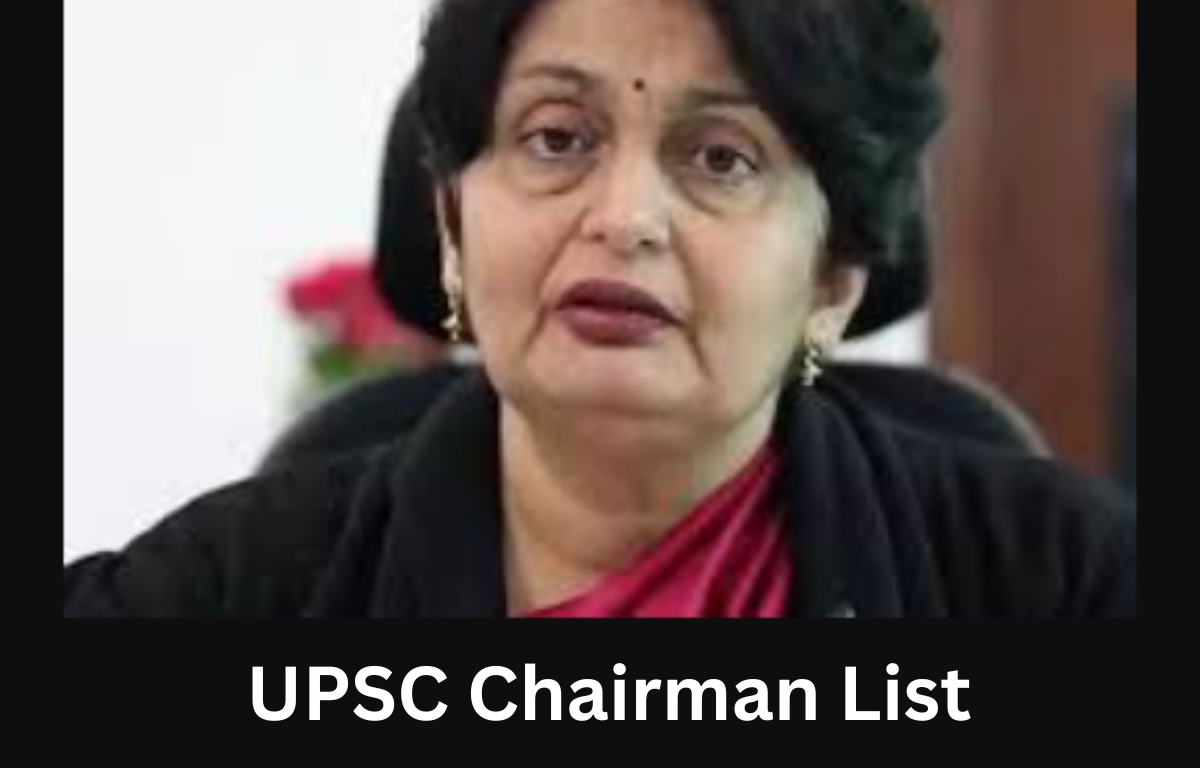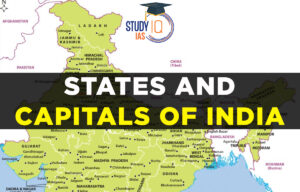Table of Contents
The Union Public Service Commission (UPSC) is a crucial constitutional body in India, responsible for the direct recruitment of officers to the All India Services and Central Civil Services through competitive examinations. Established on 1 October 1926, the UPSC has seen a series of distinguished chairpersons who have played a vital role in shaping India’s civil services.
What is the Union Public Service Commission (UPSC)?
The Union Public Service Commission (UPSC) is a constitutional body that comes under Article 315-323 part XIV of the constitution of India and this commission is responsible for the direct recruitment of officers to the All India Services and Central Civil Services through UPSC examination. This Commission was established on 1 October 1926 as the Public Service Commission, then it was reconstituted as the Federal Public Service Commission under the Government of India Act of 1935. After the independence on 26 January 1950, it was renamed the Union Public Service Commission. This commission appointed the officers in various services within the government of India.
| Overview | |
| Appointed by | President of India |
| Removed by | President of India |
| Conditions for removal |
|
| Resignation submitted to | President |
| Term of UPSC Chairman | 6 years or 65 years which comes first |
| Eligibility of UPSC Chairman | An Experience of at least 10 years in the Central or State services |
| Salary of UPSC Chairman | ₹30 Lakhs Annually, as decided by Parliament |
| Current UPSC Chairman | Preeti Sudan |
| First Chairman | Sir Ross Barker (1926- 1932) |
| First Indian UPSC Chairman | H. K. Kripalani (1947-1949) |
| First Female UPSC Chairman | Rose Millian Bathew (Kharbuli) (1992-1996) |
Current UPSC Chairman
Preeti Sudan(1983 batch IAS officer) from the Andhra Pradesh cadre previously hold the position in the Central government’s Department of Food and Public Distribution as well as in the ministries of Women and Child Development and Defence. She has also been a part of government programs including Ayushman Bharat, Beti Bachao, and Beti Padhao etc.
Term of Preeti Sudan:
Generally, the Chairperson of the UPSC serves a term of six years or until they turn 65 whichever comes first, as of now Preeti Sudan will serve until 29 April 2025. She may resign from their position by submitting their resignation to the President of India. The President has the power to remove the Chairperson of the UPSC if the Supreme Court issues a report finding in misconduct
UPSC Chairman Pre-Independence: Federal Public Service Commission
The Union Public Service Commission (UPSC) is a constitutional body that comes in Part XIV of the Indian Constitution between Articles 315 to 323. The Government of India Act of 1919 proposed the establishment of a Federal Public Service Commission. After that on the recommendations of the Lee Commission in 1924, the Federal Public Service Commission was created on 1st October 1926 under the leadership of Ross Barker. The Government of India Act of 1935 further provided for the establishment of both Central and State Public Service Commissions.
First UPSC Chairman (Post Independence)
After independence, Haribhau K. Kriplani was an Indian civil servant and the first Indian to hold the position of Chairman of the Union Public Service Commission (UPSC) from 1 April 1947 to 13 January 1949.
Early Life and Education
- Birth: He was born on 29 March 1894 in Punjab.
- Education: Kriplani studied at Government College in Lahore and later attended the University of Cambridge, where he got a degree in Economics.
First Woman UPSC Chairman
Rose Millian Bathew was an Indian Civil Servant who was the first woman to serve as the chairperson of the Union Service Commission from 23rd September 1992 to 23rd August 1996 in India. Also, she serves as an inspiration for many women seeking to pursue careers in Public Administration roles in India.
Early Life and Education
She completed her higher education at Lady Shri Ram College for Women one of the prestigious institutions in India from where she earned a degree in Economics. Also, Bathew pursued further studies and obtained her Master’s degree in Economics from the University of Delhi.
List of UPSC Chairman 1926 to 2024
Overview the following table to know about the UPSC chairman’s tenure.
| S. No. | UPSC Chairmans | From | To |
| 1 | Sir Ross Barker | October 1926 | August 1932 |
| 2 | Sir David Petrie | August 1932 | 1936 |
| 3 | Sir Eyre Gorden | 1937 | 1942 |
| 4 | Sir F. W. Robertson | 1942 | 1947 |
| 5 | H. K. Kripalani | 1 April 1947 | 13 January 1949 |
| 6 | R. N. Banerjee | 14 January 1949 | 9 May 1955 |
| 7 | N. Govindarajan | 10 May 1955 | 9 December 1955 |
| 8 | V. S. Hejmadi | 10 December 1955 | 9 December 1961 |
| 9 | B. N. Jha | 11 December 1961 | 22 February 1967 |
| 10 | Sh. K.R. Damle | 18 April 1967 | 2 March 1971 |
| 11 | Ranadhir Chandra Sarma Sarkar | 11 May 1971 | 1 February 1973 |
| 12 | Akhlaqur Rahman Kidwai | 5 February 1973 | 4 February 1979 |
| 13 | M. L. Shahare | 16 February 1979 | 16 February 1985 |
| 14 | H. K. L. Capoor | 18 February 1985 | 5 March 1990 |
| 15 | J. P. Gupta | 5 March 1990 | 2 June 1992 |
| 16 | Rose Millian Bathew (Kharbuli) | 23 September 1992 | 23 August 1996 |
| 17 | S. J. S. Chhatwal | 23 August 1996 | 30 September 1996 |
| 18 | J. M. Qureshi | 30 September 1996 | 11 December 1998 |
| 19 | Surendra Nath | 11 December 1998 | 25 June 2002 |
| 20 | Purna Chandra Hota | 25 June 2002 | September 2003 |
| 21 | Mata Prasad | September 2003 | January 2005 |
| 22 | S. R. Hashim | 4 January 2005 | 1 April 2006 |
| 23 | Gurbachan Jagat | 1 April 2006 | 30 June 2007 |
| 24 | Subir Dutta | 30 June 2007 | 16 August 2008 |
| 25 | D. P. Agrawal | 16 August 2008 | August 2014 |
| 26 | Rajni Razdan | 16 August 2014 | 21 November 2014 |
| 27 | Deepak Gupta | 22 November 2014 | 20 September 2016 |
| 28 | Alka Sirohi | 21 September 2016 | 3 January 2017 |
| 29 | David R. Syiemlieh | 4 January 2017 | 21 January 2018 |
| 30 | Vinay Mittal | 22 January 2018 | 19 June 2018 |
| 31 | Arvind Saxena (acting) | 20 June 2018 | 28 November 2018 |
| 32 | Arvind Saxena | 28 November 2018 | 6 August 2020 |
| 33 | Pradeep Kumar Joshi | 7 August 2020 | 4 April 2022 |
| 34 | Dr. Manoj Soni(acting) | 5 April 2022 | 16 May 2023 |
| 35 | Dr. Manoj Soni | 16 May 2023 | July 2024 |
| 36 | Preeti Sudan | 01 August 2024 | 29 April 2025 |
Current UPSC Members list
The Union Public Service Commission (UPSC) consists of 9 to 11 members, including the Chairman. As of now, the UPSC includes a Chairman and 6 members, all are appointed by the President of India. Below are the details about the members of the UPSC.
| Name | Service | Post | Term Started | Term End |
| Preeti Sudan | IAS | Chairperson | 1 August 2024 | 29 April 2025 |
| Lieutenant General Raj Shukla (Retd) | Indian Army | Member | 18 July 2022[ | 26 March 2027 |
| Suman Sharma | IRS | Member | 25 May 2023 | 24 May 2029 |
| Bidyut Bihari Swain | IAS | Member | 1 June 2023 | 4 September 2028 |
| Sanjay Verma | IFS | Member | 1 February 2024 | 27 January 2030 |
| Dr. Dinesh Dasa | Academician | Member | 29 Sept 2023 | 28 September 2029 |
| Sheel Vardhan Singh | IPS | Member | 15 January 2024 | 25 August 2028 |
Salary of UPSC Chairman
The salary of the UPSC Chairman is ₹30 lakhs per year. With the implementation of the Seventh Pay Commission, the UPSC Chairperson now earns ₹2.5 lakh per month while other members receive ₹2.25 lakh per month.
Tenure of UPSC Chairman
The Chairman and members of the UPSC serve a term of five years or until they reach the age of 65, whichever comes first.
Qualification of UPSC Chairman
There are no such qualifications required for the UPSC Chairman. According to the Constitution of India, 50% of the members of the UPSC must have held a government office for a minimum of 10 years.
Powers and Functions
Article 320 of the Indian Constitution states that there shall be the duty of the Union and the State Public Service Commissions to conduct examinations for appointments to the services of the Union and the services of the State respectively. We mentioned the following Powers and functions of the UPSC Chairman.
- The UPSC conducts examinations for appointments to the All-India Services, public services of centrally administered territories and Central services Group A and Group B. Also hold the direct recruitment through interviews, check the appointment of officers through promotion, deputation, Handle disciplinary cases related to different Civil Services and advise the Government on matters referred to the Commission by the President of India.
- The UPSC can check the requests from state governors to meet various needs of the state. It consults the government on matters related to management and presents an annual performance report to the President. This report is then submitted to both houses of Parliament.
- The role of the UPSC is advisory in nature and its recommendations are not binding on the government.
- All instances of non-acceptance of UPSC recommendations must be approved by the Appointments Committee of the Union Cabinet, and individual ministries or departments do not have the authority to reject UPSC’s advice.


 World Veterinary Day 2025: Theme, Histor...
World Veterinary Day 2025: Theme, Histor...
 List of States and Capitals of India, Ma...
List of States and Capitals of India, Ma...
 World Intellectual Property Day 2025, Th...
World Intellectual Property Day 2025, Th...





















